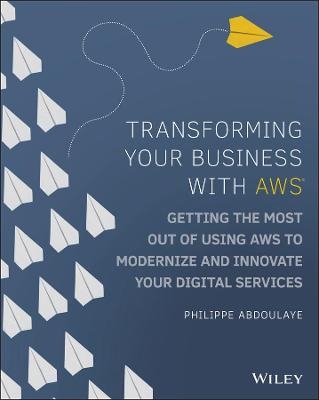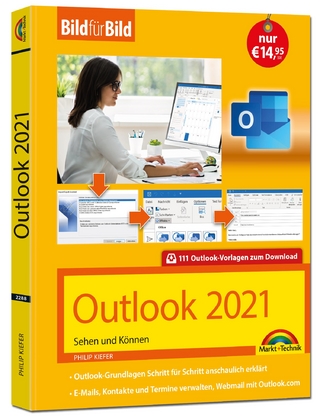
Transforming Your Business with AWS
John Wiley & Sons Inc (Verlag)
978-1-119-81597-6 (ISBN)
In Transforming Your Business with AWS: Getting the Most Out of Using AWS to Modernize and Innovate Your Digital Services, renowned international consultant and sought-after speaker Philippe Abdoulaye delivers a practical and accessible guide to using Amazon Web Services to modernize your business and the digital services you offer. This book provides you with a concrete action plan to build a team capable of creating world-class digital services and long-term competitive advantages.
You'll discover what separates merely average digital service organizations from the truly outstanding, as well as how moving to the cloud will enable your business to deliver your services faster, better, and more efficiently.
This book also includes:
A comprehensive overview of building industry-leading digital service delivery capabilities, including discussions of the development lifecycle, best practices, and AWS-based development infrastructure
Explanations of how to implement a digital business transformation strategy
An exploration of key roles like DevOps Continuous Delivery, Continuous Deployment, Continuous Integration, Automation, and DevSecOps
Hands-on treatments of AWS application management tools, including Elastic Beanstalk, CodeDeploy, and CodePipeline
Perfect for executives, managers, and other business leaders attempting to clarify and implement their organization's digital vision and strategy, Transforming Your Business with AWS is a must-read reference that answers the "why" and, most importantly, the "how," of digital transformation with Amazon Web Services.
PHILIPPE ABDOULAYE is an international digital business transformation consultant. He advises business and IT leaders on how to take advantage of digital technologies to grow and prosper. He is a sought-after speaker for technology conferences around the world and has authored seven books on digital transformation and digital technologies.
Introduction xxvii
Part I Understanding the Digital Transformation Challenges 1
Chapter 1 The Digital Economy’s Challenges, Opportunities, and Relevance of AWS 3
Understanding the Digital Economy’s Impacts 4
Surviving Disruptions Are Your Business’s Primary Challenge 4
Understanding the Digital Economy’s Opportunities 4
Surviving the Disruptions: The AWS Solutions 5
The AWS Universal Architecture: Simplifying AWS Understanding 5
Navigating AWS IaaS Building Block 6
AWS Compute Resources 7
AWS Network Resources 8
AWS Storage Resources 9
Understanding Essential AWS PaaS Tools 10
AWS Elastic Beanstalk 10
AWS CodeDeploy 10
AWS CodePipeline 11
Understanding Innovation with AWS: Machine Learning, Internet of Things, and Elastic MapReduce 11
AWS Machine Learning 11
AWS Internet of Things 12
Amazon Elastic MapReduce 12
Understanding the AWS Integration Building Block 13
Site-to-Site VPN 13
Hybrid Cloud with VMware Cloud on AWS 13
Changes in the AWS Implementation Paradigm 14
Lift-and-Shift Migration is a Problem 14
Failure Factors Making Lift-and-Shift Irrelevant 14
Understanding the Benefits of Enterprise Architecture for AWS 15
Key Takeaways 16
References 16
Chapter 2 What is a Digital Product? 17
Differences Between Digital Products and Digital Services 17
Digital Service Delivers Information 18
Digital Product Exists in Intangible Formats 18
Anatomy of the Digital Product 18
The Digital Product’s Technology Stack 18
The 4G/5G Services 19
Cloud Computing Services: Innovation as a Service 20
Smart Mobile Devices 24
Impacts on Digital Product and Service Development 24
The Growing Complexity of the Technological Stack 24
Technology Innovation Alone Isn’t Enough Anymore 25
Key Takeaways 25
References 26
Chapter 3 Digital Product and Service Development Challenges 27
What is Digital Product and Service Development? 28
Digital Product and Service Development Defined 28
How is Digital Product and Service Development Performed? 28
Ideation 29
Concept 30
Business Case 30
Development 30
Testing 31
Launch 31
Digital Product and Service Development Approach Evaluation 31
Understanding the Digital Product and Service Development Assessment Framework 32
Assessment Framework Overview 32
The Context Elements 33
The Performance Enablers 33
The Digital Transformation Solutions 34
Assessing Current Digital Product and Service Development 35
What is a Digital Product and Service Development Platform? 35
Capturing Business Context 37
Evaluating Your Digital Operating Model 37
Evaluating Your Technical Platform 38
Evaluating Your Organizational Model 40
Assessing Your Human Capital 41
Challenges of Current Digital Product Development 42
Focus on Digital Product and Service Development 42
Accurate Customer Insights 43
Competitive Pricing 43
Premium Customer Experience 43
Rapid Go-to-Market 44
Key Takeaways 44
References 44
Chapter 4 Industrializing Digital Product and Service Development 47
The Total Quality Management and Mass Production Heritage 48
Total Quality Management Principles Defined 48
Customer Focus 48
Workforce Commitment 49
Process Approach 49
Integrated System 49
Continual Improvement 49
Transversal Communication 49
Mass Production Principles Defined 49
Assembly Line 50
Work Specialization 50
Automation 50
Industrialization Factors 50
Industrialization Factor Defined 50
Families of Industrialization Factors 51
Principles Family 51
Design Patterns Family 52
Methodology Family 52
Technology Family 53
Understanding DevOps as the Framework for Implementing Your Digital Product and Service Development Platform 54
DevOps Defined 54
Understanding DevOps Components 54
Software Delivery Lifecycle’s Importance 54
DevOps Practices Purpose 56
Methodologies Benefit 58
DevOps Toolchain Importance 63
AWS Industrialization Factors 64
Understanding AWS Design Patterns: The Enterprise Cloud Migration Pattern 64
Defining AWS Enterprise Cloud Migration Pattern 65
Understanding the Baseline Architecture Purpose 66
AWS Methodology 66
Defining AWS Well-Architected Framework 66
Understanding the Industrialization Matrix for AWS 70
Key Takeaways 73
References 73
Part II Digitizing the Business Model Using AWS 75
Chapter 5 The J&S Food Digital Transformation Project 77
History of J&S Food, Inc. 77
Company’s Evolution 78
Territorial Conquest 78
Diversification 79
Company’s Culture 79
Productivity 80
Effectiveness 80
Innovation 80
Technology 81
Transformation Journey’s First Stage: Planning the Transformation 81
The Kickoff Meeting 82
Understanding the Grocery Sector’s Digital Disruption Impacts on J&S Food 82
Capturing and Analyzing the Factors Driving the Grocery Sector Disruption 84
Discussing and Agreeing on the Factors Affecting J&S’s Food Business 87
Developing and Sharing J&S Food’s Digital Mission and Digital Strategy 90
Defining J&S Food’s Mission 90
Developing J&S Food’s Digital Strategy 91
Developing J&S Food’s Digital Transformation Roadmap 94
Digital Transformation Roadmap Defined 94
Developing a Digital Transformation Roadmap 96
Understanding J&S Food’s Digital Transformation Roadmap 98
The J&S Food Digital Transformation Project’s Statement of Work 99
The Statement of Work Defined 99
Introduction/Background 99
Scope of Work 100
Work Requirements 100
Schedule/Milestones 101
Acceptance Criteria 101
Other Requirements 101
The Next Step 102
Key Takeaways 102
References 102
Chapter 6 Rethinking J&S Food’s Business 103
Transformation Journey’s Second Stage: Rethinking the Business 104
Understanding J&S Food’s Current Business 105
Capturing the Current Business Model 105
Understanding Use Cases 106
Understanding Actors 106
Understanding Links 106
The Current Business Model Captured 106
Buy 107
Fulfill Order 108
Pay 109
Perform Customer Service 109
Manage Supply Chain 110
Maintain Website 111
Develop Food Product 112
Understanding J&S Food’s Current Data Model 112
Assessing the As-Is Operational Model 113
Digital Food Experience Defined 113
Assessing J&S Food’s Operational Model 114
Defining the Digital Smart Shopping Bag 116
Optimizing the Fulfill Order Experience Based on a Two-Sided
Marketplace Platform 117
Enhancing Online Order Experience Using a Mobile App 118
Implementing a Digital Products and Services Development Platform 118
Defining the Future Digital Business Model 118
Reconfiguring J&S Food’s Operational Model 119
Understanding Michael Porter’s Value Chain 119
The Value Chain for Digital Business Defined 121
J&S Food’s Digital Business Model Defined 123
Understanding J&S Food’s Next Digital Value Chain 123
Support Digital Business Activities 123
Primary Digital Business Activities 124
Understanding J&S Food’s AWS Cloud Platform 126
J&S Food’s AWS Software as a Service 126
The J&S Food’s Platform as a Service 126
The J&S Food’s AWS Virtual Infrastructure 126
Integrating J&S Food’s Digital Operational Model with the Organization 127
The Digital Business Value Chain: A Shortcut to the Digital Business Organization 127
Digital Business Organizational Model Defined 127
Developing the Digital Business Organizational Model 128
The J&S Organizational Model Defined 130
Roles and Responsibilities 130
Interaction and Collaboration Mechanisms 132
Key Takeaways 132
References 133
Chapter 7 Digitizing J&S Food’s Business Model Using AWS—Implementing the VPC 135
Transformation Journey’s Third Stage: Digitizing the Business Model 136
Defining J&S Food’s AWS Migration Strategy 137
Sharing J&S Food’s Digital Business Model 138
Defining the J&S Food’s Digital Business Application Portfolio 139
Specifying J&S Food’s Virtual Private Cloud Architecture 141
Understanding the Enterprise Cloud Migration Model For AWS 141
J&S Food’s Virtual Private Cloud Specified 141
The Availability Zone 142
Amazon CloudFront and the Content Delivery Network 143
J&S Food’s Virtual Private Cloud 143
J&S Food’s Extended Elastic Compute Cloud Building Block 145
J&S Food’s Extended Storage Build Block 149
J&S Food’s Extended Fault Tolerance Building Block4 150
J&S Food’s Extended Security Build Block 151
Executing J&S Food’s AWS Migration Strategy 152
Understanding the AWS Application Migration Process 152
Discover 152
Design 152
Build 153
Integrate 153
Validate 153
Cutover 153
Migrating J&S Food’s Ecommerce Website Into a Two-Sided Marketplace Platform 154
Implementing J&S Food’s Virtual Private Cloud 154
Discovering the Ecommerce Website Three-Tier Architecture 155
Extending the Ecommerce Website Architecture to a Two-Sided Marketplace Platform 157
Implementing J&S Food’s Two-Sided Marketplace Platform 161
Validating the Two-Sided Marketplace Platform 165
Key Takeaways 165
References 166
Chapter 8 Implementing J&S Food’s DevOps Platform Using AWS PaaS 167
Transformation Journey’s Third Stage: Implementing J&S Food’s DevOps Platform 168
Understanding What J&S Food is Trying to Achieve 169
Understanding the DevOps Implementation in the AWS Computing Environment 169
Discussing the Challenges 170
Understanding the Common Mistakes 171
The DevOps Implementation Framework for AWS 171
The Digital Business Value Chain Primary Activities and AWS Modern Application Influence 172
The AWS CodePipeline Service 173
Understanding DevOps Implementation for AWS 175
Implementing J&S Food’s Digital Product and Service Development Platform 177
J&S Food’s Digital Product and Service Development Platform 177
J&S Food’s DevOps Toolchain 178
J&S Food’s Digital Business Primary Activities 180
Designing the Agile Operating Model 181
The Usual Challenges and Solutions 181
J&S Food’s Agile Operating Model Defined 182
Key Takeaways 183
References 184
Chapter 9 Developing J&S Food’s Innovation as a Service Platform Using AWS 185
Transformation Journey’s Third Stage: Developing J&S Food’s Innovation as a Service 185
Software Engineering Methodology for Innovations Development in the AWS Cloud 186
Software Engineering Methodology for Innovations Development 187
Driving Principles Explained 187
Key Concepts to Understand 189
Understanding the Innovative Digital Product Development Lifecycle 193
The Five-Step Development Lifecycle 193
Specifying the Innovative Digital Product Using a UML Use Case Diagram 194
Designing the Innovative Digital Product Using a UML Package Diagram 196
Prototyping the Microservices Using AWS Amplify 197
Developing and Deploying the Application Supporting the Innovative Digital Product 198
Implementing the Microservices Architecture of the Digital Product and Service 200
The User Interface Microservices 201
The Business Logic Microservices 201
The Technology Microservices 201
Key Takeaways 202
References 202
Part III Developing World-Class Digital Products and Services Using AWS 205
Chapter 10 J&S Food’s Smart Shopping Bag Digital Product Project 207
Transformation Journey’s Fourth Stage: Experimenting with the Digital Business Model 208
The Smart Shopping Bag Project Overview 208
The Smart Shopping Bag Project’s Organization 209
The Smart Shopping Bag Project’s Opportunity Statement 209
The Smart Shopping Bag Project’s Objectives 210
The Smart Shopping Bag Project’s Scope 210
The Pilot Project Management 211
Key Takeaways 211
References 212
Chapter 11 Specifying J&S Food’s Smart Shopping Bag Digital Product 213
Transformation Journey’s Fourth Stage: Specification of the Smart Shopping Bag Digital Product 213
Specifying the Smart Shopping Bag Digital Product’s Scope 214
Using Context Diagrams to Improve the Specification Process 215
Developing the Smart Shopping Bag’s Context Diagram 215
J&S Food’s Stores IoT Infrastructure 215
J&S Food’s AWS IoT Core Platform 216
Developing the Smart Shopping Bag Use Case Diagram 216
Identifying the Smart Shopping Bag’s Actors and Use Cases 218
Specifying the Smart Shopping Bag’s Functions Using Sequence Diagrams 221
Use Case Description: Press Start to Begin Shopping 221
Use Case Description: Respond to In-Store Customer Button Presses 222
Use Case Description: Detect Product Code Put in the Bag 223
Use Case Description: Send EEPROM Data to Billing System 225
Use Case Description: Respond to RFID Reader Queries 226
Use Case Description: Calculate the Bill Amount 226
Specifying the Smart Shopping Business Rules Using Class Diagram 228
The In-Store Customer 228
The Smart Shopping Bag 230
The RFID Reader 230
The Product RFID Tag 230
The Smart Mobile Device 231
The Shopping Session 231
The Smart Shopping Service 231
The Smart Shopping Bag Application 231
Key Takeaways 232
References 232
Chapter 12 Designing J&S Food’s Smart Shopping Bag Digital Product 233
Transformation Journey’s Fourth Stage: Designing the Smart Shopping Bag Digital Product 233
The Agile Operational Model Confirmed as the Foundation of J&S Food’s Work Organization 234
J&S Food’s New Organization of Work 234
The Princeton’s Digital Product Development Team Defined 235
UML Package Diagram Facilitates the Microservices Architecture Design Process 237
Lucidchart Confirmed as the Best Architecture Tool 237
Overall Feedback 237
The Resulting Smart Shopping Bag’s Architecture 238
The Smart Shopping Bag Blueprint 239
The In-Store Customer Package 240
The Shopping Session Package 240
The Smart Shopping Bag Package 241
Acquired Digital Business Competency: Digital Products and Services Architecture Design 241
Key Takeaways 241
References 242
Chapter 13 Prototyping J&S Food’s Smart Shopping Bag Using Innovation as a Service 243
Transformation Journey’s Fourth Stage: Prototyping the Smart Shopping Bag’s Application 244
Sharing the Prototyping Process Goal and Approach 245
Prototyping Using AWS Amplify Defined 245
The Prototyping Iterations Using AWS Amplify 245
The Prototyping Team 251
The Team’s Feedback 252
The Smart Shopping Bag Application Prototype 253
The Business Logic, Technological, and UI Microservices Prototyped 255
The Microservices Development Process in the AWS Amplify Context 255
Defining the Microservices Granularity 256
The Smart Shopping Bag Business Logic Microservices Implemented 257
The Smart Shopping Bag Business Logic Microservices Documented 257
The Smart Shopping Bag Technological Innovation Microservices Implemented 259
IoT Gateway Microservices 259
AWS IoT Core Microservices 261
RFID Reader Microservices 263
RFID Tag Microservices 265
The Smart Shopping Bag UI Microservices Implemented 265
Key Takeaways 266
References 267
Chapter 14 Implementing J&S Food’s Smart Shopping Bag Application 269
Transformation Journey’s Fourth Stage: Implementing the Smart Shopping Bag’s Production Release 270
The Smart Shopping Bag App: Production Release 270
Blueprint of the Smart Shopping Bag in Production 270
Understanding the Production Release Building Blocks 271
Application Layer 271
AWS Innovation Layer 273
AWS Virtual Infrastructure Layer 274
Understanding the Pivotal Role Played by Agile Methodologies 275
The Architectural Spike and Prototyping Benefits 275
The Importance of Scrum Sprints in the Incremental Development Effort 275
Understanding the Vital Role of the Daily Scrums 276
The Development Team’s Feedback: Lessons Learned 277
Key Takeaways 278
References 278
Chapter 15 Launching J&S Food’s First Digital Food Product 279
Transformation Journey’s Fourth Stage: Deploy J&S Food’s Digital Business 279
Defining J&S Food’s Go-To-Market Strategy 280
The Go-To-Market Strategy Defined 281
Articulating J&S Food’s Go-To-Market Strategy 281
The Objectives Questionnaire 282
The Value Propositions Questionnaire 282
The Key Processes to Stress Questionnaire 282
The Organizational and Technological Assets to Stress Questionnaire 282
J&S Food’s Go-To-Market Strategy Defined 282
Understanding J&S Food’s Go-To-Market Strategy 283
Declaring J&S Food’s Digital Business Opened 284
Key Takeaways 284
References 285
Chapter 16 Maintaining and Supporting J&S Food’s Digital Business on a Daily Basis 287
The New J&S Food Day-to-Day Business 287
J&S Food’s Customer Value Creation Virtuous Circle 288
J&S Food’s Virtuous Circle for Creating Customer Value 288
Customer Insights Management on a Daily Basis 289
J&S Food’s AWS EMR Infrastructure 289
Business Data Providers 290
Data Lake 290
Data Warehouse 290
Data Mart 290
The Big Data Analytics Activity in the Customer Insights Management Team 291
Customer Value Increase Management’s Day-to-Day Operations 292
J&S Food’s AI/ML Development Environment 292
Generate Data 293
Train Models 293
Deploy Models 294
The Customer Increase Value Management Team’s Activity 294
Digital Product and Service Releases Development 295
Defining Product Backlog 295
Sprint Planning 296
Sprint Execution 296
Key Takeaways 296
References 297
Index 299
| Erscheinungsdatum | 21.12.2021 |
|---|---|
| Verlagsort | New York |
| Sprache | englisch |
| Maße | 185 x 234 mm |
| Gewicht | 567 g |
| Themenwelt | Mathematik / Informatik ► Informatik ► Netzwerke |
| Informatik ► Office Programme ► Outlook | |
| Technik ► Elektrotechnik / Energietechnik | |
| ISBN-10 | 1-119-81597-5 / 1119815975 |
| ISBN-13 | 978-1-119-81597-6 / 9781119815976 |
| Zustand | Neuware |
| Haben Sie eine Frage zum Produkt? |
aus dem Bereich


